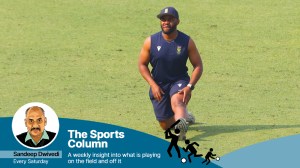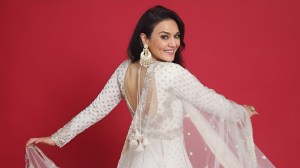CBI: Our men in Hawala
When Elvis Presley wowed the world with his I don wanna be a Tiger / For Tigers play too rough'', I rather doubt that he had in mind Jogi...

When Elvis Presley wowed the world with his “I don wanna be a Tiger / For Tigers play too rough”, I rather doubt that he had in mind Joginder Singh, our redoubtable TV star and, when he can spare the time from the cameras, Director of the CBI. But between the courts and the CBI, we seem to have come full circle from the time when political power was used to protect the guilty to now when investigative and judicial powers appear to have combined to persecute the innocent.
My mind travels back to a year and a few months ago. From mid-January 1996 on, the CBI, the Supreme Court and the media, not to mention the Government and the Opposition, had combined to serve up the most delectable scandal ever, with a cast of stars to beat a Bollywood blockbuster. I refer, of course, to the Great Hawala Scam. As the chattering classes positively writhed in ecstasy at this spectacular confirmation of the worst they had always loved to believe of our political classes, Minister after Minister tendered his resignation, even as giants of the Opposition went gently — and some not so gently — into the political night. It felt irresistibly as it must have in a Roman amphitheatre when the Emperor turned down his thumb to signal the crowds in the stands and the gladiators in the arena that the contest would end only when one of them was slain.
I explained to Vajpayee on the floor of the House then that if the courts compelled the CBI to submit chargesheets when its investigation was not complete, the very purpose of filing a chargesheet — which is to secure a conviction — would be lost. I was much admired for my sophistry but my argument carried little conviction. To the Opposition, as much as to the Government of the day, the mere mention of a name in a chargesheet was enough to secure political exaction of the severest kind. So, the heads of the rich and the famous rolled as if we were in the middle of the French Revolution.
Worse, while I am certain it was no part of the Supreme Court’s intention to do so, the fact remains that the outcome of the elections of May 1996 — the most unstable Lok Sabha our democracy has ever seen — was, in substantial measure, the consequence of the CBI being obliged to file charges before it had secured the evidence to warrant such drastic action, and the public outcry which the naming of the high and the mighty inevitably occasioned.It is easy enough to say — and possibly more prudent — that, in this case, it is fair to target the CBI but not quite proper to lump the hon’ble Justices of the Supreme Court with Tiger Joginder and his hapless predecessors. But I ask you to reflect: if in January 1996, the CBI had told the Supreme Court that after five years of investigation, it had not turned up the evidence that would stand the test of judicial scrutiny, would such an assertion have had any credibility? Our democracy has reached the stage where everyone outside Parliament is baying for the blood of those within. Hence, if a series of initials in diaries seized in a raid on terrorists and their associates matched those of a series of leading politicians, it would have taken a brave — or, at any rate, insensitive — Government to tell the courts that VCS could either be Vidya Charan Shukla or, possibly, Vaidyalingam Chandrashekara Shokkalingam. Or possibly not.
That, however, is what, in effect, Delhi High Court Justice V. B. Gupta has concluded.
Diary entries in themselves do not constitute proof of identity. Other validating evidence is necessary. The CBI pleaded till January 1996 that it had the diaries; it had even, to its satisfaction, deciphered the initials; but, alas, it did not have the corroborative proof to establish that MRS did, in fact, stand for Madhav Rao Scindia. And, therefore, it was staying its hand at filing charges. It was against its volition that the CBI was compelled to file charges. The High Court has now held that filing charges without evidence sustainable in a court of law is not tenable. Unless the Supreme Court reverses the High Court’s verdict, what started with a bang is going to end in a whimper.
We can leave it to the courts to determine what is the position in law of the “evidence” collected. But it is for us, not the courts, to determine what are the implications for political propriety of the naming of individuals of political distinction in chargesheets. Former Chief Justice Ahmadi has counselled that if the CBI does not have the proof required, it should have the courage to so tell the courts. But what if the CBI is not believed? What if the highest court in the land believes that chargesheets are not being filed because Government, by deliberately reining in the CBI, is shielding the guilty? How can the CBI and, by implication, the Government, credibly tell the courts or the people that it is shielding no one when none less than the Supreme Court is heavily hinting that there appears to be rather more than the mere absence of proof to the unending delay in filing charges? If would take a brave — or, at any rate, insensitive — CBI to tell the Supreme Court, in these circumstances, that it is not filing charges because the former Chief Justice has told the CBI it need not do so.
As for the political family, Jaswant Singh is the author of the doctrine, delightedly endorsed by the media and maimed ravenously by our chattering classes, that the usual rule of law — innocent till proved guilty — does not apply to politicians. Says Jaswant, even if, as a citizen, the politician charged has the right to plead innocent, he must first pay the political price and only then take up cudgels in court to establish his innocence. Such Marquis of Queensbury rules are all very well for those who went to Mayo and earned their epaulettes as army Majors; but what when Laloo Prasad Yadav says he is not going to be driven into the political wilderness only to secure a certificate of good conduct twelve long years later, like Abdur Rahman Antulay? Is the evidence against Laloo any more than it apparently was against Antulay?



- 01
- 02
- 03
- 04
- 05




























